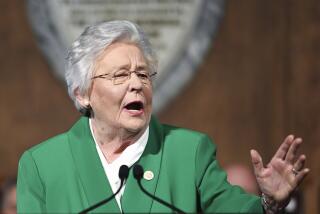Card check: unions’ salvation?
Today’s topic: Supporters of the Employee Free Choice Act say the bill’s passage would go a long way toward reversing the decline in union membership. The bill’s opponents say the real reason for the decline of unions is that workers simply don’t want to join them. Which side is correct, and how much would the Act’s passage affect the size and influence of unions? This week’s Dust-Up has included exchanges on the impact unions have on ailing U.S. automakers, whether the trend of declining union membership will reverse and President Obama’s labor policies.
When unions win, we all win
Point: David Madland
Nearly three in five American workers say they would vote to join a union if they could, according to a poll done by Peter D. Hart Research Associates. Yet only 8% of private-sector workers are union members -- down from about one-third in the middle of the 20th century -- because existing laws make organizing a union a Herculean task that few want to undertake.
Unionizing workers face an undemocratic system that allows them to be intimidated by their employers. Bosses can legally force workers to attend anti-union meetings and have “one-on-one conversations” about the union, which happens in more than 90% of all organizing campaigns, according to a Cornell University study. Workers often are pressured by employers to reveal their private preferences for joining a union, and thus the current process does not truly keep “secret ballots” a secret.
When employers cross the line and actually break the law, penalties are weak and insufficient. In about 25% of all organizing campaigns, workers are illegally fired and can at best hope to recover their lost wages and get reinstated in their jobs, often after several years of legal battles. And even if workers prevail against these odds, employers often refuse to negotiate with the union.
Unfairly preventing workers from organizing is a violation of basic human rights; it is also bad for the economy. Without strong unions, our entire community pays a heavy price: Wages lag and workers don’t have the purchasing power needed to drive the economy; race and gender pay gaps widen; and insecurity, poverty and inequality increase.
The Employee Free Choice Act would promote free and fair union elections by making it harder for employers to intimidate workers. The bill would increase penalties for employers who break the law, allow an employee to choose to join a union by signing a membership card (a system that works well at the small number of workplaces that permit it) and encourage good-faith bargaining so employees can collectively negotiate a first contract. The act would not deny workers their right to vote in a union election, as some conservatives maintain; rather, if 30% of workers were to say they wanted an election, they would get one.
If the Employee Free Choice Act becomes law, union members will likely grow. Though it is hard to say by how much, the bill holds the potential of improving millions of Americans’ economic standing and workplace conditions. Workers in the public sector, where government employers typically remain neutral in union elections, are four times more likely to be unionized than those in the private sector. But no matter how many more workers join unions, the bill’s impact would be profound because it would make clear that employers can no longer deny workers the right to join a union.
David Madland is director of the American Worker Project for the Center for American Progress Action Fund.
The rights of workers versus the rights of union bosses
Counterpoint: Shikha Dalmia
David, you keep insisting that the misleadingly titled Employee Free Choice Act is about protecting workers who wish to unionize from employer intimidation. However, you fail to explain how taking away the right of workers to a secret ballot election would accomplish this. I worked for a corporation, so I am well aware of the subtle tactics that companies can use to influence workers. But that’s all the more reason to keep a worker’s final decision private.
Let’s be honest: The purpose of card check is not to protect workers from employer intimidation, but to expose them to union coercion. How many late-night home visits by local union bosses will a worker be able to resist before signing on the dotted line? Which worker will refuse to check a card if accosted in his company locker room by union supporters? It is precisely because of such concerns that even staunch labor supporters such as the Rev. Al Sharpton and former Sen. George McGovern are fighting this bill and urging fellow Democrats to oppose it. Secret ballots are the pillar of democratic self-governance.
David, you note that 60% of private-sector workers said in a poll that they want a union yet only 8% of the private workforce is unionized. This, to you, is proof positive that employer coercion is preventing widespread unionization. But there is nothing inconsistent about workers wanting a union in theory (I want one too) but rejecting the one being offered to them in practice because it would force them to pay dues without giving them any say in how their money is spent. Yet that’s what unions currently do.
Resorting to coercive tactics such as eliminating secret ballots is not the right way to restore flagging union membership. This won’t sit well with workers. (A 2004 Zogby poll conducted for the Mackinac Center for Public Policy found that between 53% and 84% of union workers prefer secret ballots.) The more enlightened approach would be to accept reforms that make unions more accountable, such as paycheck protection that would require written approval from members before their dues are diverted toward political activity.
You are right, however, that card-check coercion might well boost union membership. Unionization rates in Canada, where many provinces allow card check, are three times those in the United States. Many U.S. service industries such as pharmacies, day-care centers and hotels might well become targets of unionization drives under a card-check regime.
However, if the historic performance of unionized states in this country is any indication, the Employee Free Choice Act wouldn’t restore the great American middle class -- as you claim -- but would instead do the opposite. Unions certainly extract great wages and benefits for their workers; witness the life-long healthcare coverage that members of the United Auto Workers get. But the price is paid by the rest of the economy. According to the Mackinac Center, seven of the eight states that experienced nonfarm employment growth of 3% or better in 2006 were right-to-work states that prohibit forced union dues. Similarly, between 1970 and 2000, manufacturing employment grew by 1.43 million jobs in right-to-work states but declined by 2.18 million in closed-shop states.
This is not to suggest that unions shouldn’t drive a tough bargain on behalf of their workers. David, you previously mentioned the obscene paychecks received by the CEOs of U.S. automakers even as their companies are going bankrupt. In fact, the problem of overpaid management is not limited to the top rungs of American automakers; it is endemic throughout the ranks of management. So there is absolutely nothing wrong in unions trying to get more parity. However, they cannot ignore market realities and raise labor costs to such an extent that companies can’t compete.
Yet that’s what American unions have done. Finding the right balance that serves both workers and employers is what will ultimately secure the long-term health of unions -- not undemocratic, strong-arm tactics against their own members.
Shikha Dalmia is a senior analyst at the Reason Foundation.
More to Read
A cure for the common opinion
Get thought-provoking perspectives with our weekly newsletter.
You may occasionally receive promotional content from the Los Angeles Times.










